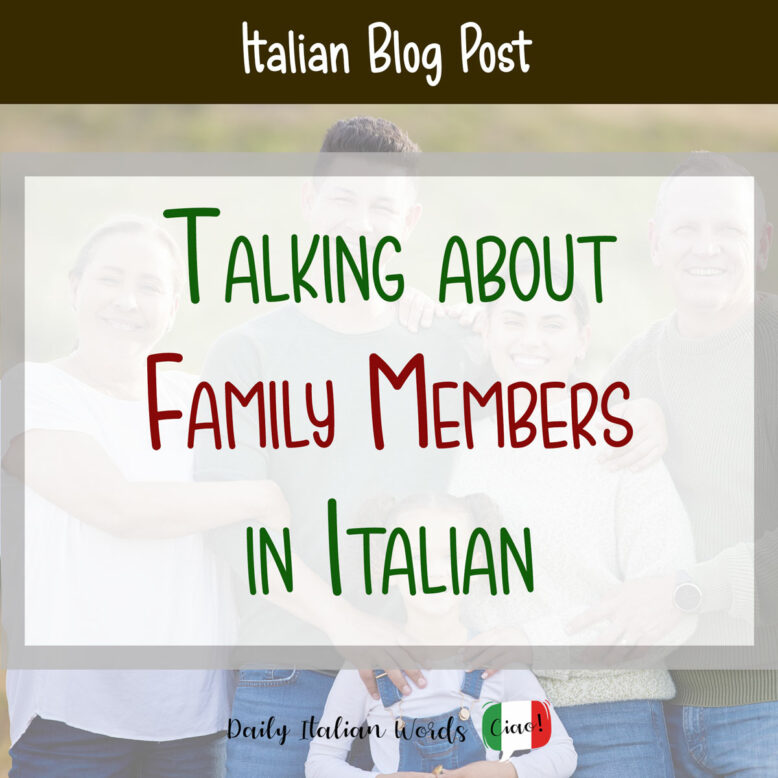In Italy you’ll often hear the saying La famiglia viene prima di tutto (family comes before everything). And boy, do we mean it! In Italy, la famiglia (family) isn’t just a concept; it’s the centerpiece of life. Picture lively gatherings during the feste comandate (major bank holidays) sprinkled with the occasional dash of drama, nonni (grandparents) turning into babysitting wizards so their kids can snag a moment of peace or get work done, and don’t forget all those cherished family recipes, guarded with love and tradition.
It’s no surprise then that conversations about family here are as common as the ritual morning espresso. Whether you’re looking to impress your Italian sweetheart, trace the lineage of long-lost relatives, or simply want to dive into the heart of Italian culture, knowing the right terms for family members in Italian is crucial for discussing familial bonds with ease.
So, let’s explore the essential Italian family tree vocabulary, from the beloved nonni to distant ancestors. Stick around till the end for some fun Italian sayings about family that always manage to sneak into conversations!

Immediate family members in Italian
Let’s start with the key terms for those nearest to you in your family constellation:
| English | Italian | Notes |
| Parents | I genitori | you’ll often hear Italians refer to i miei (mine) or i tuoi (yours) when talking about parents, which is a shorter way of saying i miei genitori (my parents) or i tuoi genitori (your parents). |
| Father | Il padre / Il papà | Typically addressed with various affectionate nicknames such as pa, papi, papino, paparino, babbo, papo, papone |
| Mother | La madre / La mamma | Also typically addressed with sweet nicknames like mà, mammà, mami, mammina, mammetta |
| Son | Il figlio | |
| Daughter | La figlia | |
| Eldest child | Il primogenito / La primogenita | |
| Second-born | Il secondogenito / La secondogenita | |
| Only child | Figlio unico / Figlia unica | |
| Siblings | Fratelli | |
| Brother | Il fratello | |
| Older brother | Il fratello maggiore | Also the playful form fratellone |
| Younger brother | Il fratellino | |
| Sister | La sorella | |
| Older sister | La sorella maggiore | Also the playful form sorellona |
| Younger sister | La sorellina | |
| Twins | I gemelli / Le gemelle | |
| Husband | Il marito | You may also hear him affectionately referred to as maritino, a sweet diminutive form |
| Wife | La moglie | You may also hear her addressed with the affectionate diminutive mogliettina |
| Spouse | Il coniuge |

Relatives in Italian
Next up are the Italian family words to talk about the diverse array of parenti (relatives) that enrich our lives. You know the ones – grandparents with a never-ending supply of treats and wisdom, uncles who never fail to crack a joke, and so on!
Remember: while the word parenti may sound similar to parents in English, in Italian it specifically refers to relatives. Italians use genitori for parents.
| English | Italian | Notes |
| Grandparents | I nonni | Endearing variants include the diminutives nonnini and nonnetti |
| Grandfather | Il nonno | Also called with the diminutives nonnino or nonnetto |
| Grandmother | La nonna | Also called with the diminutives nonnina or nonnetta |
| Great grandparents | I bisnonni | |
| Great grandfather | Il bisnonno | |
| Great grandmother | La bisnonna | |
| Grandchildren | I nipoti | Also with the sweet little nickname nipotini (little grandchildren) |
| Grandson | Il nipote | Also nipotino (little grandson) |
| Granddaughter | La nipote | Also nipotina (little granddaughter) |
| Great grandchildren | I pronipoti | |
| Great grandson | Il pronipote | |
| Great granddaughter | La pronipote | |
| Uncles | Gli zii | Also affectionately referred to as zietti (little uncles) |
| Uncle | Lo zio | Also called zietto (little uncle) or zione (big uncle) |
| Aunt | La zia | Also called zietta (little aunt) or ziona (big aunt) |
| Cousins | I cugini | Also referred to as cuginetti (little cousins) |
| Cousin | Il cugino / La cugina | Also with the diminutives cuginetto and cuginetta |
| Nephew | Il nipote | Also called nipotino (little nephew) |
| Niece | La nipote | Also called nipotina (little niece) |
Note: when talking about nonni, you can specify whether they are from your father’s side or mother’s side by adding paterno (paternal) or materno (maternal) after the term. For example, nonni paterni for paternal grandparents, nonno materno for maternal grandfather, nonna paterna for paternal grandmother, etc.
Second note: as you may have noticed, the word nipote can mean grandchild, grandson, granddaughter, nephew, or niece. You can determine the gender by the article that precedes the word (e.g., la nipote for feminine and il nipote for masculine), but without additional context, it’s impossible to know whether someone is referring to a grandchild or a sibling’s child.

In-laws in Italian
Now let’s talk about the so-called parenti acquisiti, that is all those relatives who become part of our family through marriage. Unlike English, where you simply add ‘in-law’ at the end of the word to denote these relationships, in Italy we have specific names for each newly acquired family member:
| English | Italian | Notes |
| The in-laws | I suoceri | |
| Father-in-law | Il suocero | |
| Mother-in-law | La suocera | |
| Son-in-law | Il genero | |
| Daughter-in-law | La nuora | |
| Brother-in-law | Il cognato | Also cognatino (little brother-in-law) if you want to add a touch of endearment |
| Sister-in-law | La cognata | Also cognatina (little sister-in-law) to add a sweet tone |

Step family in Italian
What if your parents divorced and got married to someone else? You can use the following terms total about the new members of the family:
| English | Italian | Notes |
| Stepfather | Il patrigno | |
| Stepmother | La matrigna | |
| Stepson | Il figliastro | |
| Stepdaughter | La figliastra | |
| Stepbrother | Il fratellastro | |
| Stepsister | La sorellastra | |
| Domestic partner | Il convivente / La convivente | You could also say il compagno / la compagna |
| Boyfriend | Il fidanzato | |
| Girlfriend | La fidanzata |
Note: traditionally, pejorative suffixes such as -igno, -igna, -astro, and -astra have been used to refer to step-family members in Italian. However, these terms can carry negative connotations, likely influenced by the way they’re shown in children’s tales. Think about la matrigna di Cenerentola (Cinderella’s stepmother) – not exactly the nicest character, right? So, to avoid accidentally sounding negative, it’s best to opt for phrases like il compagno di mia madre (my mother’s partner), la seconda moglie di mio padre (my father’s second wife), or i figli di mio padre (my father’s kids) when describing step-family relationships.

Talking about adoption and fostering in Italian
And now let’s focus on the key Italian vocabulary of adoption and fostering:
| English | Italian |
| Adoptive family | La famiglia adottiva |
| Adoptive parents | I genitori adottivi |
| Adoptive father | Il padre adottivo |
| Adoptive mother | La madre adottiva |
| Biological parents | I genitori biologici |
| Biological father | Il padre biologico |
| Biological mother | La madre biologica |
| Foster family | La famiglia affidataria |
| Foster parents | I genitori affidatari |
| Foster father | Il padre affidatario |
| Foster mother | La madre affidataria |
| Foster child | Il bambino / La bambina in affidamento |
| Legal guardian | Il tutore / La tutrice |

Distant relatives in Italian
If you’re embarking on the journey of tracing your family lineage, here are some useful Italian words for discussing distant relatives:
| English | Italian |
| Geneaology | Genealogia |
| Family tree | Albero genealogico |
| Direct line of descent | Discendenza diretta |
| Generation | Generazione |
| Ancestors | Antenati |
| Distant relatives | Lontani parenti |
| Great-great-grandparents | Trisavolo / Trisavola |
| Relationship | Parentela |
| Paternal | Da parte di padre |
| Maternal | Da parte di madre |

Other useful family terms in Italian
Let’s wrap up this list of Italian family member vocabulary with some additional terms you may come across in everyday conversation:
| English | Italian | Notes |
| Single-parent family | La famiglia monogenitoriale | |
| Rainbow family | La famiglia arcobaleno | |
| Single parent | Il genitore single | |
| Single father | Il padre single | Also referred to as a ragazzo padre (literally, boy father) if he’s young |
| Single mother | La madre single | Also referred to as a ragazza madre (literally, girl mother) if she’s young |
| Surrogate mother | La madre surrogata | |
| Godfather | Il padrino | |
| Godmother | La madrina | |
| Separated | Separato / Separata | |
| Divorced | Divorziato / Divorziata | |
| Widower | Vedovo | |
| Widow | Vedova |

Useful phrases to talk about family in Italian
When talking about family members in Italian, the following phrases may come in handy:
- Sei sposato/a? (Are you married?)
- Sono sposato da tre anni (I’ve been married for three years)
- Hai figli? (Do you have kids?)
- Ho due bambini di 3 e 5 anni (I have two kids, one is 3 and the other is 5 years old)
- Quanti siete in famiglia? (How many of you are in your family?)
- Vengo da una famiglia numerosa, siamo in otto! (I come from a large family, there are eight of us)
- Hai fratelli o sorelle? (Do you have any brothers or sisters?)
- Tutto bene a casa? (Is everything good at home?)
- Come stanno i tuoi? (How are your parents?)
- Siamo una famiglia molto unita (We are a very close-knit family)
- I miei bisnonni erano originari di un piccolo paese in Calabria (My great-grandparents came from a small village in Calabria.)

Family wisdom: some Italian proverbs and sayings
Here’s a sneak peak of popular family-related Italian sayings and idioms that express familial concepts and situations with sharp accuracy:
- Tale padre, tale figlio (Like father, like son): a classic saying that’s frequently invoked to highlight the resemblance or similarity between fathers and their children, particularly when humorously pointing out some shared negative traits.
- Buon sangue non mente (Good blood doesn’t lie): similarly to the previous one, this saying playfully celebrates the virtues of children, attributing their positive qualities to their parents.
- Suocera e nuora, tempesta e gragnola (Mother-in-law and daughter-in-law, storm and hail): this Italian proverb humorously captures the thunderous clashes and hailstones of disagreement that may occasionally arise between mother-in-law and daughter-in-law, the two women who hold the most significant place in a man’s life.
- Amor di madre, amore senza limiti (A mother’s love has no limits): This Italian saying beautifully encapsulates the eternal bond shared between a mother and her children, defying all barriers of time and space.
- Parenti serpenti (Snake relatives): this proverb warns against the betrayals and irreparable fractures that often generate amidst the family. Its popularity is such that it has been immortalized in a beautiful Christmas movie by Monicelli.
Click here for more heartwarming Italian quotes about family!

Valentina Nicastro is a travel writer in love with her home country, Italy. Having travelled widely around the globe, she realised there was more to explore closer to home and decided to put the passport aside for a while. When she is not immersed in documenting Italy, you’ll find her donning her communication consultant hat, weaving words as a content writer and bridging linguistic divides as a translator.


